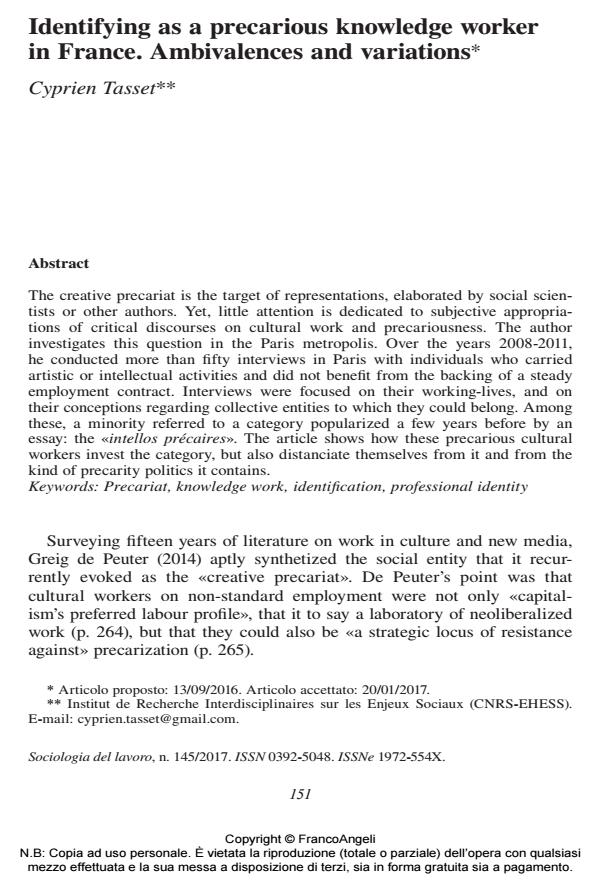Identifying as a precarious knowledge worker in France. Ambivalences and variations
Titolo Rivista SOCIOLOGIA DEL LAVORO
Autori/Curatori Cyprien Tasset
Anno di pubblicazione 2017 Fascicolo 2017/145
Lingua Inglese Numero pagine 17 P. 151-167 Dimensione file 123 KB
DOI 10.3280/SL2017-145009
Il DOI è il codice a barre della proprietà intellettuale: per saperne di più
clicca qui
Qui sotto puoi vedere in anteprima la prima pagina di questo articolo.
Se questo articolo ti interessa, lo puoi acquistare (e scaricare in formato pdf) seguendo le facili indicazioni per acquistare il download credit. Acquista Download Credits per scaricare questo Articolo in formato PDF

FrancoAngeli è membro della Publishers International Linking Association, Inc (PILA)associazione indipendente e non profit per facilitare (attraverso i servizi tecnologici implementati da CrossRef.org) l’accesso degli studiosi ai contenuti digitali nelle pubblicazioni professionali e scientifiche
The creative precariat is the target of representations, elaborated by social scientists or other authors. Yet, little attention is dedicated to subjective appropriations of critical discourses on cultural work and precariousness. The author investigates this question in the Paris metropolis. Over the years 2008-2011, he conducted more than fifty interviews in Paris with individuals who carried artistic or intellectual activities and did not benefit from the backing of a steady employment contract. Interviews were focused on their working-lives, and on their conceptions regarding collective entities to which they could belong. Among these, a minority referred to a category popularized a few years before by an essay: the «intellos précaires». The article shows how these precarious cultural workers invest the category, but also distanciate themselves from it and from the kind of precarity politics it contains.
Il precariato creativo è il bersaglio delle rappresentazioni, elaborate dagli scien-ziati sociali o da altri autori. Eppure, poca attenzione è dedicata alle appropriazioni soggettive dei discorsi critici sul lavoro culturale e sulla precarietà. L’autore in-daga questa questione nella metropoli parigina. Tra il 2008 e il 2011 ha raccolto più di cinquanta interviste a Parigi con individui che svolgevano attività artistiche o intellettuali e che non godevano del sostegno di un contratto di lavoro stabile. Le interviste sono state focalizzate sulle loro vite lavorative e sulle loro concezioni a proposito delle organizzazioni collettive a cui gli stessi avrebbero potuto apparte-nere. Tra questi, una minoranza riferita a una categoria diventata nota in Francia alcuni anni prima attraverso un saggio: gli «intellos précaires». L’articolo mostra come questi lavoratori culturali precari fanno parte della categoria, ma anche si distanziamo da essa e dal tipo di politica di precarietà che esprime.
Parole chiave:Precariato, lavoro della conoscenza, identificazione, identità professionale
Cyprien Tasset, Identifying as a precarious knowledge worker in France. Ambivalences and variations in "SOCIOLOGIA DEL LAVORO " 145/2017, pp 151-167, DOI: 10.3280/SL2017-145009